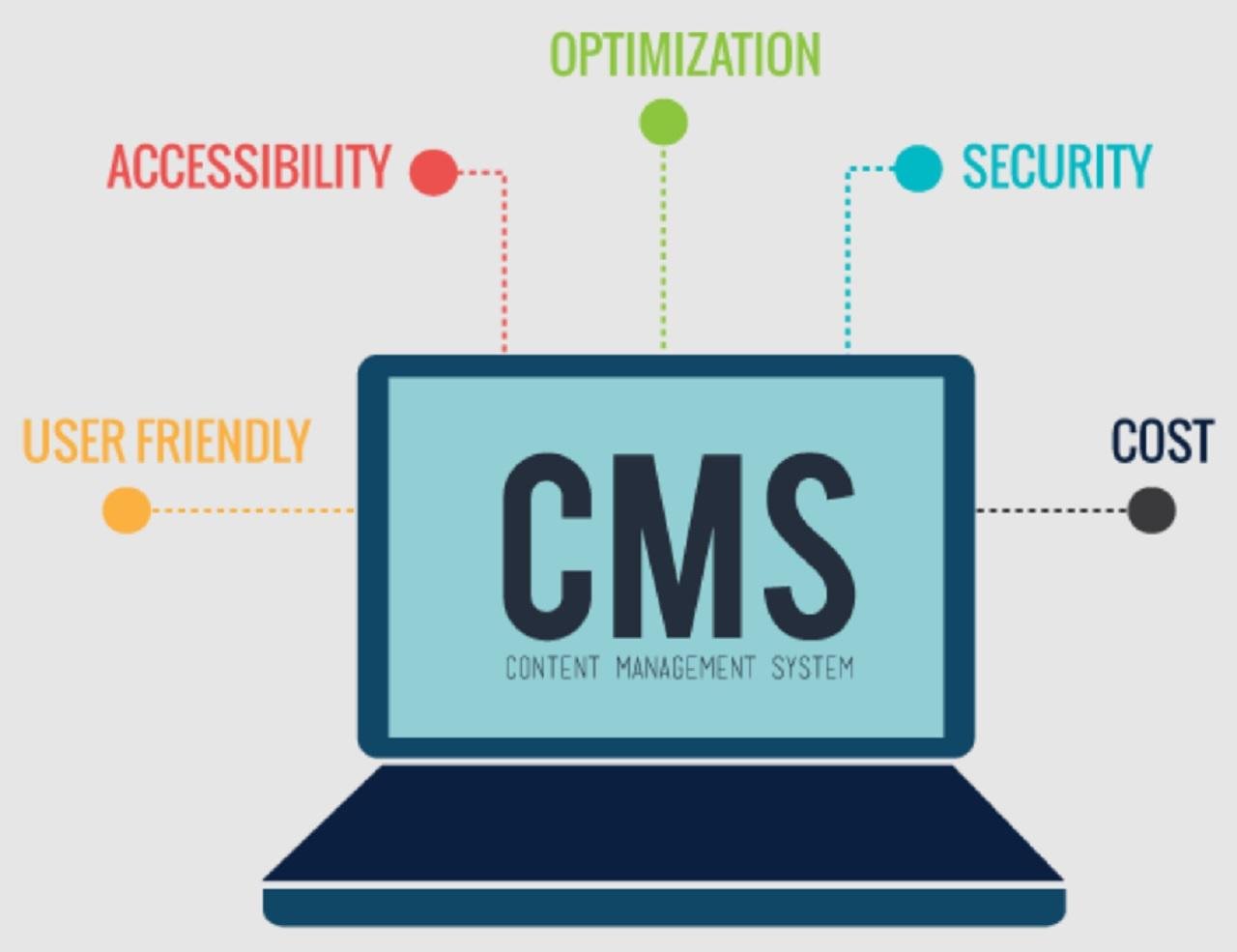The digital landscape is constantly evolving, and websites have become an integral part of every business, organization, and individual’s online presence. However, managing a website effectively requires more than just attractive design and engaging content. It demands a robust and efficient content management system (CMS).
In this article, we will explore what a CMS is, its fundamental features, and why it is essential for website management.
Defining a Content Management System (CMS)

A Content Management System (CMS) is a software application that enables users to create, modify, and manage digital content seamlessly, without requiring extensive technical expertise. It acts as a user-friendly interface, providing individuals with tools to organize, publish, and maintain website content efficiently.
A Content Management System typically consists of three primary components:
- Content Creation: Users can generate and edit content using a WYSIWYG (What You See Is What You Get) editor, simplifying the process for non-technical users.
- Content Storage: The CMS stores content in a database, ensuring easy access and retrieval when required.
- Content Delivery: It facilitates the publishing of content to the website, allowing users to control the display and structure.
Key Features of CMS: Empowering Website Management with Flexibility and Control
A robust content management system (CMS) offers a wide array of features that empower users to efficiently manage and maintain their websites. These features go beyond simple content creation and include customization options, workflow management, SEO optimization, mobile responsiveness, and much more.

In this section, we will delve into the key features of a CMS that make it an indispensable tool for website management. By harnessing these features, businesses can enhance productivity, streamline processes, and create a seamless online experience for their audience.
User Management:
A CMS provides role-based access control, allowing administrators to define user roles and assign specific permissions. This feature ensures that multiple individuals can collaborate on website management while maintaining control and security.
Content Editing and Publishing:
The CMS offers a user-friendly interface for creating and editing content, enabling users to format text, insert media, and preview changes before publishing. This feature empowers content creators with flexibility and enhances productivity.
Customization and Flexibility:
CMS platforms often support a wide range of themes, templates, and plugins, allowing users to personalize the appearance and functionality of their websites. This flexibility enables businesses to align their online presence with their brand identity and adapt to evolving market trends.
Workflow and Version Control:
Advanced CMSs offer workflow management features that streamline content creation, review, and approval processes. Version control ensures that content revisions can be tracked, rolled back, and compared, maintaining accuracy and accountability.
SEO Optimization:
CMSs often integrate SEO tools and features that assist in optimizing website content for search engines. These features include metadata management, URL customization, XML sitemap generation, and keyword analysis, resulting in improved search engine rankings and visibility.
Mobile Responsiveness:
With the increasing usage of mobile devices, CMSs offer responsive design capabilities, ensuring websites adapt to different screen sizes. This feature enhances user experience, improves search engine rankings, and broadens the website’s reach.
To gain a better understanding of the Content Management System (CMS), it is crucial to delve into the world of content analysis and keyword analysis. Content analysis allows you to assess and evaluate the effectiveness of your content strategy, enabling you to identify areas for improvement and optimize your website’s messaging.
By conducting a thorough keyword analysis, you can uncover valuable insights into the search behavior of your target audience, helping you incorporate relevant keywords strategically throughout your content. With a CMS, you can easily manage, organize, and update your content, ensuring that it remains fresh and engaging for your users.
By harnessing the power of content analysis, keyword analysis, and a robust CMS, you can streamline your content management processes, enhance user experience, and drive organic traffic to your website. So, don’t hesitate to leverage these powerful tools and take your content management to new heights. Start analyzing your content and keywords today, and unlock the true potential of your online presence.
Read Also: Best 8 Keyword Tracking Tools for SEO Excellence
The Importance of CMS for Website Management: Streamlining Operations and Driving Digital Success
In today’s fast-paced digital landscape, effective website management is paramount for businesses aiming to establish a strong online presence and stay ahead of the competition. A content management system (CMS) plays a crucial role in this endeavor by providing a centralized platform that simplifies content creation, editing, and publishing.

The importance of a CMS extends far beyond its user-friendly interface, offering a range of benefits such as time and cost efficiency, scalability, collaborative capabilities, consistent branding, data security, and valuable insights. In this section, we will explore why a CMS is essential for website management, how it empowers businesses, and how it enables them to navigate the dynamic digital realm with ease.
By embracing a CMS, organizations can unlock their website’s full potential and effectively engage with their target audience, driving digital success in today’s interconnected world.
User-Friendly Interface:
CMS platforms are designed to simplify website management, allowing individuals without technical expertise to update content easily. This eliminates the need for external technical support, reducing costs and enabling businesses to maintain an up-to-date website efficiently.
Time and Cost Efficiency:
Content Management Systems significantly reduces the time and effort required to manage a website. Content creation, editing, and publishing are streamlined, and changes can be implemented promptly, improving efficiency and productivity. Moreover, CMSs eliminate the need for custom coding, saving development costs.
Scalability and Growth:
CMS platforms are scalable, accommodating the expansion of websites as businesses grow. New pages, features, and functionalities can be added seamlessly, ensuring websites can evolve alongside the changing needs of businesses and users.
Collaborative Environment:
CMSs provide a collaborative environment where multiple users can work together on website management. With defined roles and permissions, team members can contribute, review, and approve content efficiently. This fosters teamwork and enables businesses to maintain consistency and quality across their digital platforms.
Consistent Branding and Design:
CMSs offer customization features, ensuring websites reflect the brand identity consistently. Companies can establish a cohesive online presence by using consistent colors, fonts, logos, and design elements. This enhances brand recognition and fosters trust among website visitors.
Data Security and Backup:
CMSs provide robust security measures to protect websites from cyber threats. Regular security updates, user authentication, and secure data storage mechanisms safeguard sensitive information.
Additionally, Content Management Systems often offer automatic backup and restore functionalities, mitigating the risk of data loss.
Analytics and Insights:
Many CMS platforms integrate analytics tools, providing valuable insights into website performance, visitor behavior, and content effectiveness. This data helps businesses make informed decisions, refine their digital strategies, and optimize website performance.
Conclusion
In the modern digital era, a robust Hosted CMS is vital for businesses and individuals. It streamlines content creation, editing, and publishing, offering a user-friendly interface, customization, and scalability. With a Hosted CMS, organizations can keep their websites up-to-date, collaborate effectively, and maintain brand consistency.
Furthermore, CMS platforms offer essential features such as SEO optimization, mobile responsiveness, and data security, which contribute to improved search rankings, user experience, and data protection. As the digital landscape continues to evolve, embracing a CMS becomes essential for businesses aiming to stay competitive, streamline operations, and leverage their online presence effectively.
By harnessing the power of a CMS, organizations can unlock the true potential of their websites and achieve their digital goals with efficiency and ease.






